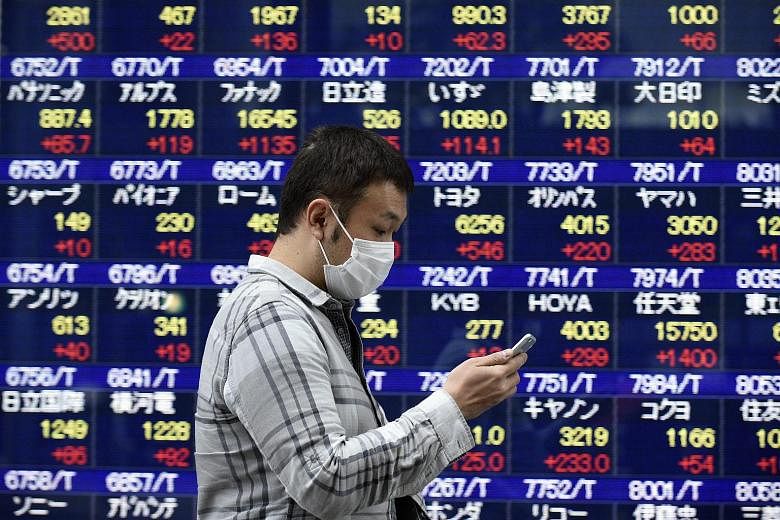SYDNEY (REUTERS, BLOOMBERG) - Asian shares were taking a breather on Wednesday (Feb 17) after two sessions of solid gains, while oil prices swung higher as the market reconsidered the chances of a meaningful deal to restrict supply later in the year.
The mood was still skittish - when China set a slightly lower guidance rate for its yuan, the yen and safe-haven bonds got an instant boost. As investors realised this was not some message from Beijing on devaluation, the moves quickly reversed.
Yet nerves had settled enough for stocks to make some modest gains. MSCI's broadest index of Asia-Pacific shares outside Japan edged up 0.2 per cent, having climbed 3 per cent over the previous two sessions.
The Shanghai Composite Index gained 0.6 per cent and South Korea 0.2 per cent. Japan's Nikkei eased 0.2 per cent, but is still up more than 7 per cent on the week.
Singapore's Straits Times Index was 0.93 per cent at 2,620 at noon.
E-Mini futures for the S&P 500 firmed 0.2 per cent after Wall Street broke its negative feedback loop with oil.
The Dow ended Tuesday with gains of 1.39 per cent, while the S&P 500 added 1.65 per cent and the Nasdaq 2.27 per cent.
A survey of global fund managers found they had become so cautious they were holding more cash than at any time since late 2001, an "unambiguous buy" signal according to Bank of America Merrill Lynch.
In commodity markets, oil was whipsawed after top exporters, Russia and Saudi Arabia, agreed to freeze output levels but said the deal was contingent on other producers joining in.
Attention in now on a meeting between Iraq and Iran in Tehran. with Brent futures in London gained as much as 2 per cent, paring Tuesday's 3.6 per cent loss after news Iran's Oil Minister Bijan Namdar Zanganeh will meet with counterparts from Iraq, the second-biggest Opec producer, and Venezuela on Wednesday.
"Iraq and Iran are the two countries that are going to contribute to growth from the Opec nations this year," Richard Gorry, managing director at JBC Energy Asia in Singapore, said in a Bloomberg Television interview.
"Getting an agreement from these is going to be very difficult, particularly in the case of Iran. I wouldn't expect oil to breach US$40 until we get into the second half of the year, that's simply because we're massively oversupplied."
Markets are also awaiting minutes of the Federal Reserve's last meeting to judge the balance of opinion among policymakers on the prospect of further rate hikes.
Boston Fed President Eric Rosengren certainly sounded in no hurry to tighten. Speaking late on Tuesday, Mr Rosengren said the Fed would need to ratchet down economic forecasts it made in December because of the uncertain global outlook.
Doubts about the pace of any further hikes kept the US dollar restrained at 96.871 against a basket of currencies. It was steady on the yen at 114.05, after finding support around 113.60.
The big loser was sterling, which has struggled so far in 2016 because of worries the UK might leave the euro zone.
Traders said UK markets face a pivotal week ahead of a two-day summit starting on Thursday at which Prime Minister David Cameron will try to persuade other leaders to support a deal to keep Britain in the European Union.
Sterling was stuck at US$1.4300, having shed 1 per cent against the dollar on Tuesday.

